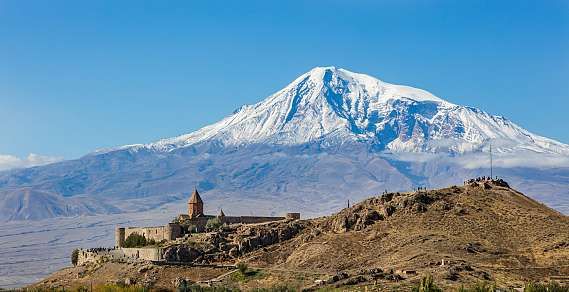
Marching Toward Change – Faith & Governance in the Movement for THE RIGHTS OF NATURE
Mari Margil on Rights of Nature – Read the complete text published by the Center for Humans and Nature.
Our insistence that each human being is an image of God should not make us overlook the fact that each creature has its own purpose. None is superfluous. The entire material universe speaks of God’s love, his boundless affection for us. Soil, water, mountains: everything is, as it were, a caress of God.
—Pope Francis, May 24, 2015, Laudato Si’[1]
Those fighting for rights and freedom know that change never just happens.
It may seem that the bending of the “arc of the moral universe . . . toward justice” about which Dr. Martin Luther King spoke—witnessed with the abolishment of slavery, the recognition of rights of indigenous peoples, of African-Americans, of women—is inevitable. It’s not. It never has been.
The long history of people’s movements shows us that fundamental shifts in society only occur when people join together to demand such change. This requires mass mobilization across countries, cultures, religions, and even time—taking decades, generations, and centuries to achieve—each requiring major shifts in consciousness to achieve major shifts in law and governance.
Today, as we face overlapping environmental crises, we need a fundamental shift in humankind’s relationship with the natural world—this means a major shift in how we govern ourselves toward nature. To achieve this requires advancing major societal and cultural shifts, as well—that is, changing how societies think about nature and humanity’s role as part of it, and the recognition that nature is worthy of respect, protection, and rights.
The Role of Faith in Cultural Shifts
One of the first places I ever spoke publicly about the rights of nature was at the First Unitarian Church in Portland, Oregon, in 2009. As part of the Econvergence Symposium, I presented on a panel that focused on how unfettered economic growth was driving us to environmental and economic crisis.[2]
It is axiomatic that religion plays a major role in shaping culture. What we believe and how we think about the world are often deeply influenced by our faith. For instance, a 2015 Pew Research Center report found that over 60 percent of white evangelical Protestants in the United States do not believe in human evolution.[3] Belief that God is the creator of the Earth is a central tenet of their faith.[4] By contrast, over 85 percent of those without a religious affiliation believe in human evolution.
Too often, religion has been wielded to legitimize the oppression of others, including nature. In 1493, Pope Alexander VI issued a papal bull which divided the world between Portugal and Spain, mandating that they colonize the new world and ensure that “barbarous nations be overthrown and brought to the faith itself.” Subjugation of both nature and people had the blessing of the Catholic Church.
Karenna Gore, director of the Center for Earth Ethics at Union Theological Seminary in New York, described the historic role of the church in defining our relationship with nature.[5] In her keynote address at the 2017 Rights of Nature Symposium held at Tulane Law School, she explained:
The way that Christianity has been interpreted from medieval Europe to the age of colonization to the efforts in the 1950s in America to wed it to capitalism through moves like putting “In God We Trust” on the money . . . to the contemporary expressions of the Prosperity Gospel, mainstream religion has contributed to the objectification and exploitation of nature.
But Gore also spoke of the shift in consciousness within faith to protect nature, including the rights of nature: “There has been a lot of recent effort to retrieve and revive the ecological sensibility within the Judeo-Christian tradition, including reinterpretations of the Bible based on ancient Aramaic and Hebrew and Greek.”
Just as we’re seeing people of faith today advocate protection of nature, during the colonial era we saw people of faith advocate for abolishing slavery. In 1688, the Quakers of Germantown, Pennsylvania, issued their protest against slavery, writing, “There is a saying, that we shall doe to all men like as we will be done ourselves; making no difference of what generation, descent or colour they are.”[6] In the United States and Britain, Quakers would become a leading voice of opposition against slavery and the slave trade.
Faith played an important role in shifting societal perspectives on slavery, making possible the abolishment of slavery. President Abraham Lincoln, whose Emancipation Proclamation attempted to free the slaves in the South, stated in 1860, just a year before the start of the Civil War:
I think that if anything can be proved by natural theology, it is that slavery is morally wrong. God gave man a mouth to receive bread, hands to feed it, and his hand has a right to carry bread to his mouth without controversy.[7]
Today—as species extinction occurs far faster than natural background rates, as coral reefs are bleaching and dying off in the world’s oceans, as climate change accelerates—we are once again seeing faith play an important role in driving necessary change.
Just as the Old Testament and religious teachings speak of man’s dominion over the Earth, helping drive the belief that humankind is separate from and superior to nature, today some leading voices in the faith community are showing a new way of understanding.
In 2015, Pope Francis received worldwide praise for his encyclical on the environment, Laudato Si’, in which he called for the protection of “our common home.” He begins by quoting Saint Francis of Assisi, who said it is “Mother Earth, who sustains and governs us.”
Later that same year, Pope Francis spoke again on the need to protect nature, and specifically the rights of nature.
